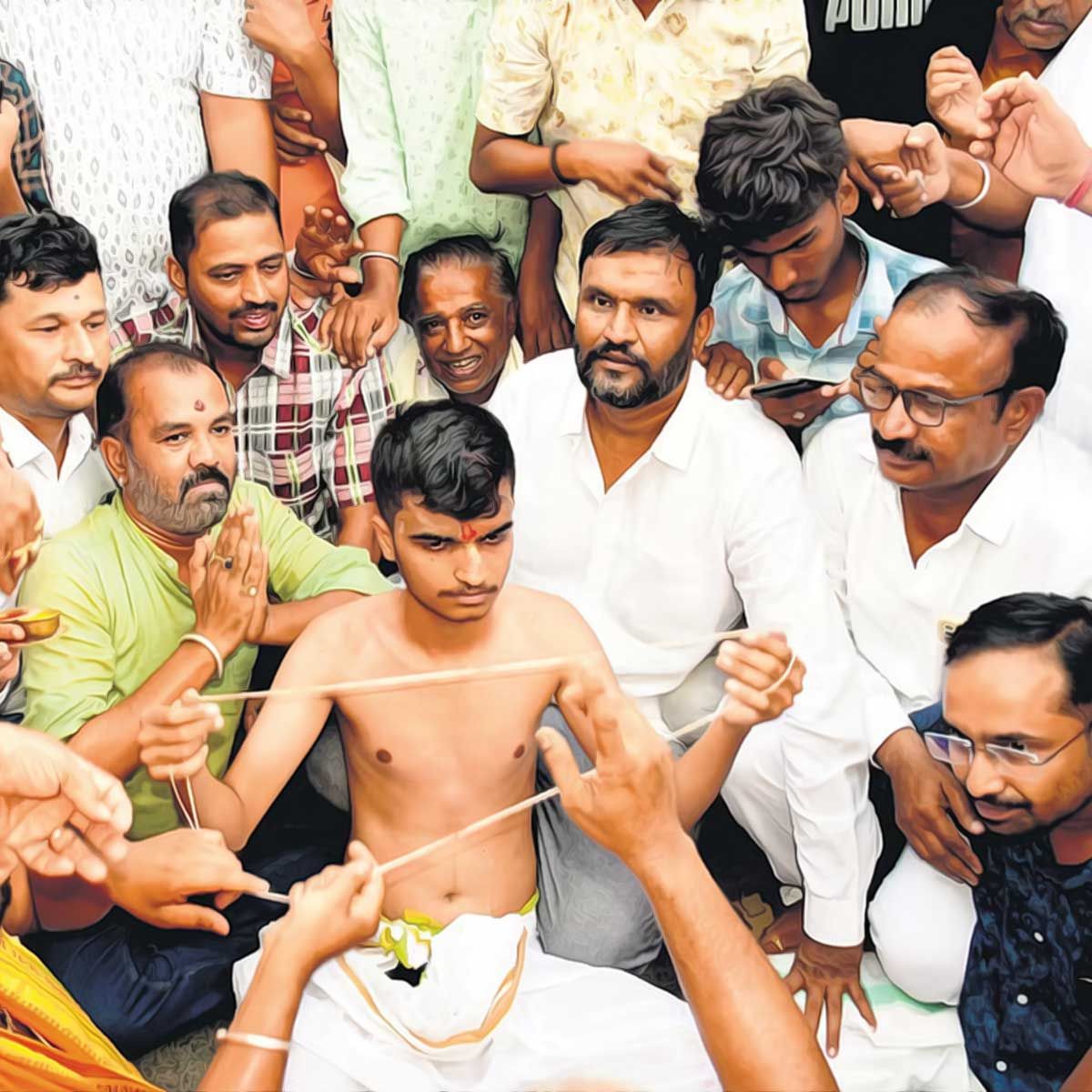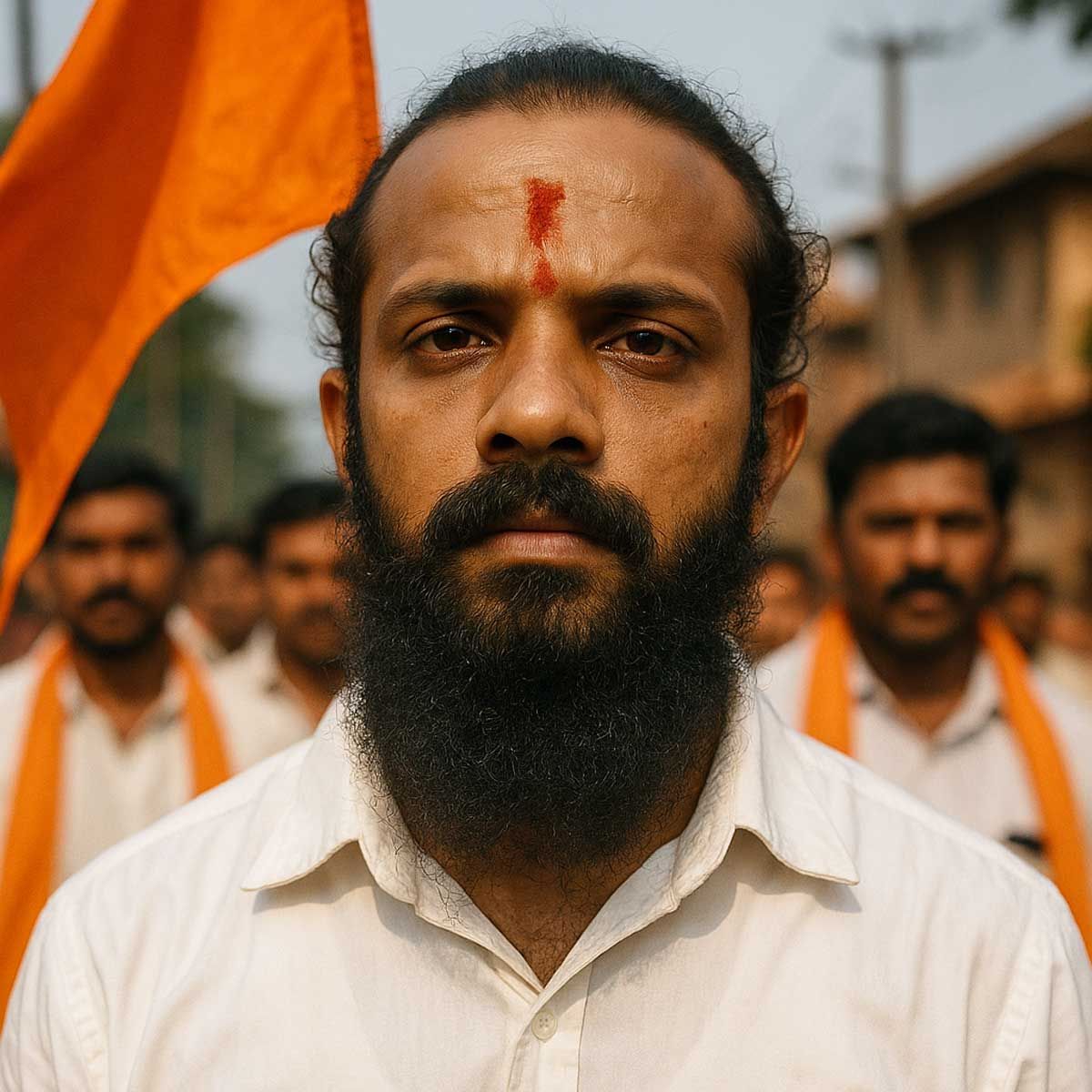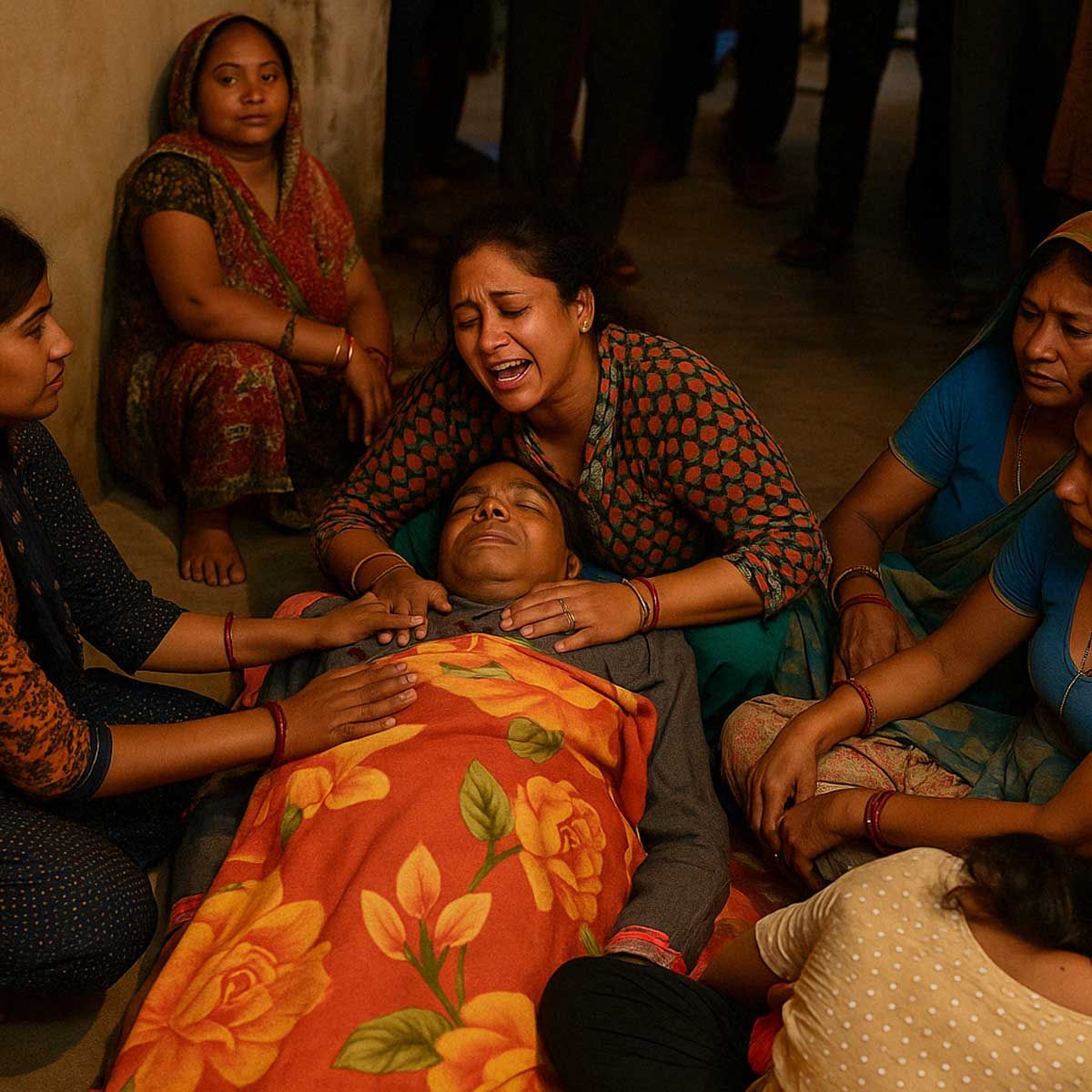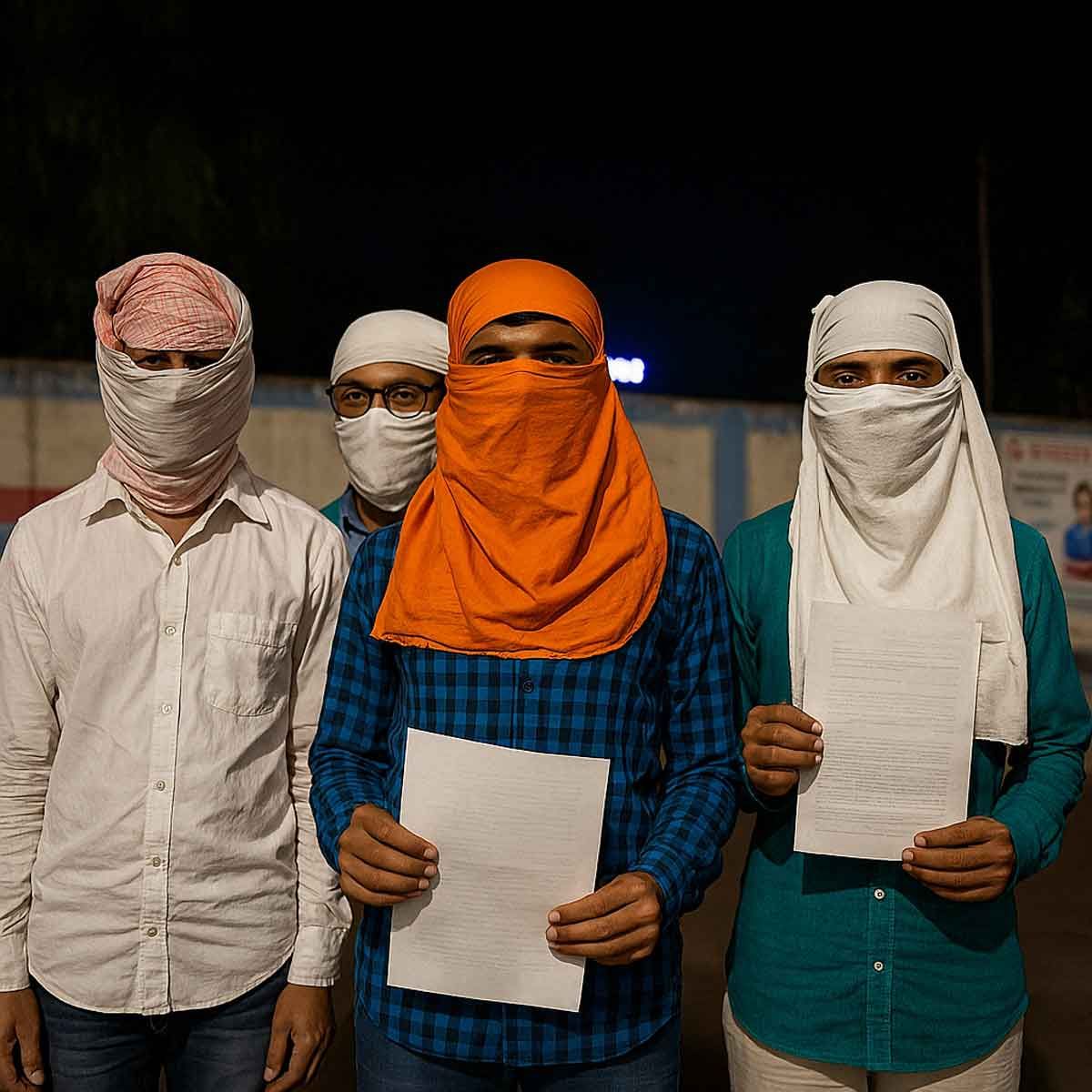More Coverage
Twitter Coverage
Satyaagrah
Written on
Satyaagrah
Written on
Satyaagrah
Written on
Satyaagrah
Written on
Satyaagrah
Written on
JOIN SATYAAGRAH SOCIAL MEDIA
"Knowledge is the eye of desire and can become the pilot of the soul": Modi Govt informs Lok Sabha that Bhagavad Gita is now part of textbooks for Class 6th & Class 7th, shlokas from Bhagavad Gita and knowledge from Vedas to be included in NCERT

On Monday, 19 December, the Centre informed the Lok Sabha that the National Council of Education Research and Training (NCERT) should include Shlokas from Shrimad Bhagavad Gita and knowledge from Vedas in textbooks in Sanskrit from classes 11th to 12th. Besides, references from Bhagavadgita should be incorporated in NCERT textbooks of classes 6th to 7th.
|
Annapurna Devi, Minister of State for Education, stated in a written response that the ministry formed the Indian Knowledge System (IKS) Division in the All India Council for Technical Education (AICTE) in 2020 with the goal of promoting interdisciplinary and trans-disciplinary research on all facets of Indian Knowledge Systems (IKS), preserving and disseminating IKS knowledge for further research and societal applications.
Minister Devi stated that NCERT has begun the development of National Curriculum Frameworks (NCF) where inputs from various ministries, departments, states, and union territories are invited from grass root levels.
She added that the National Education Policy (NEP) 2022, paragraph 4.27, refers to Indian traditional knowledge that is both sustainable and strives for the welfare of all. She also laid emphasis on teaching the world the “Indian way of doing things.”
“To become the knowledge power in this century, we must understand our heritage and teach the world the ‘Indian way’ of doing things,” she asserted.
Notably, the parliamentary panel has also advised the NCERT to incorporate the achievements and sacrifices of “unsung freedom fighters” from all regions of the country including the Northeast.
Additionally, it was suggested that prominent Indian female personalities from various professions be included in NCERT’s “regular books” with their contributions in order to make it “mandatory reading material.”
To no surprise, the move has been criticized by the Congress party and the other opposition parties. The opposition has alleged that the Narendra Modi government is trying to saffronise the Indian education system.
|
NCERT curriculum is finally going to change, a move that can undo decades of misinformation
- Modi government has finally started the work on the revision of the National Curriculum Framework (NCF).
- The previous NCFs have failed to remove the colonial shadow from both the education mechanism and curriculum.
- First attempts to bring back the coherency in the Indian Education System were undertaken under the Atal Bihari Vajpayee government.
- Indian students would be reading textbooks that would reflect the self-confidence of an Atma Nirbhar India that seeks to become Vishwaguru in the coming decades.
After repeated promises and delays, the Modi government had finally started its work on the revision of the National Curriculum Framework (NCF) and appointed ISRO chief K Kasturirangan, head of the drafting committee of the National Education Policy (NEP) 2020, to lead it.
The operational National Curriculum Framework, which was drafted and implemented in 2005 under the Congress-Communist government, is riddled by leftist biases because a majority of the people in the textbook drafting committee were communists from JNU.
The committee also includes National Book Trust chairman Govind Prasad Sharma, who has been the president of RSS’s education wing Vidya Bharati, which runs a chain of schools across the country. Sharma is still a member of Vidya Bharti’s central executive committee.
Other members of the committee include National Institute of Educational Planning and Administration Chancellor Mahesh Chandra Pant, IIM Jammu chairperson Milind Kamble, Chancellor of the Central University of Punjab, Bathinda, Prof Jagbir Singh, social activist M K Sridhar, founder-director of Language and Learning Foundation Dhir Jhingran and co-founder and CEO at EkStep Foundation Shankar Maruwada.
The educational curriculum in India has been a point of major controversy in the past. Many claiming that the previous NCFs have failed to remove the colonial shadow from both the education mechanism and curriculum.
The transition of the British East India Company’s rule to the rule of the British crown further magnified the need to introduce a British inclined education system. This education system was used to create human resources required to aid British imperialistic rule over India. Different commissions were set up for this purpose.
|
T.B. Macaulay, considered to be the forbearer of the western style of education, had indicated the biases that still prevail in Indian Education System. “We must at present do our best to form a class who may be interpreters between us and the millions whom we govern, -a class of persons Indian in Blood and color, but English in tastes, in opinions, in morals and in intellect. To that class we may leave it to refine the vernacular dialects of the country, to enrich those dialects with terms of science borrowed from the Western nomenclature, and to render them by degrees fit vehicles for conveying knowledge to the great mass of the population,” said Macaulay.
The government tried to correct these biases in NEP and that will be reflected in NCF also. NEP states that elements such as knowledge from ancient India “will be incorporated in an accurate and scientific manner throughout the school curriculum wherever relevant” and that “Indian Knowledge Systems, including tribal knowledge and indigenous and traditional ways of learning, will be covered and included in mathematics, astronomy, philosophy, yoga, architecture, medicine, agriculture, engineering, linguistics, literature, sports, games, as well as in governance, polity, conservation”, and under Dr Kasturirangan, one is sure that the country will an NCF document that will be as sophisticated as National Education Policy, which won praise from people across the political spectrum.
“The Committee will finalise National Curriculum Frameworks after incorporating suggestions received from various stakeholders, i.e., states/UTs and also in the meetings of Executive Committee (EC) and General Body (GB) of the NCERT and Central Advisory Board on Education (CABE),” the statement said. The committee, which will have a tenure of three years, would also “reflect upon the implications of situations such as Covid-19 pandemic” on respective areas for future in drawing up the NCF.
First attempts to bring back the coherency in the Indian Education System were undertaken under the Atal Bihari Vajpayee government. In 2000/01, the National Council of Educational Research and Training (NCERT) issued a National Curriculum Framework for school education under the slogan of “Indianize, nationalize and spiritualize”. The framework called for the purging of all foreign elements from the curriculum in state schools. The new policy involved a massive textbook revision.
The revisions were contested by a petition to the Supreme Court brought by three activists who argued that the NCERT had not followed the correct procedures of consultation with the states and that it had tried to introduce religious teaching, which is forbidden by the constitution. However, the Supreme Court rejected this petition. As soon as Congress took over after the 2004 general elections, it imposed the NCF in 2005. With the new committee, which includes people from a wide range of experience, and most importantly include technologists and scientists, not JNU ideologues, India would get a fair and balanced curriculum.
In the next few years, the Indian students would be reading textbooks that would reflect the self-confidence of an Atma Nirbhar India that seeks to become Vishwaguru in the coming decades.
References:
 Support Us
Support Us
Satyagraha was born from the heart of our land, with an undying aim to unveil the true essence of Bharat. It seeks to illuminate the hidden tales of our valiant freedom fighters and the rich chronicles that haven't yet sung their complete melody in the mainstream.
While platforms like NDTV and 'The Wire' effortlessly garner funds under the banner of safeguarding democracy, we at Satyagraha walk a different path. Our strength and resonance come from you. In this journey to weave a stronger Bharat, every little contribution amplifies our voice. Let's come together, contribute as you can, and champion the true spirit of our nation.
 |  |  |
| ICICI Bank of Satyaagrah | Razorpay Bank of Satyaagrah | PayPal Bank of Satyaagrah - For International Payments |
If all above doesn't work, then try the LINK below:
Please share the article on other platforms
DISCLAIMER: The author is solely responsible for the views expressed in this article. The author carries the responsibility for citing and/or licensing of images utilized within the text. The website also frequently uses non-commercial images for representational purposes only in line with the article. We are not responsible for the authenticity of such images. If some images have a copyright issue, we request the person/entity to contact us at This email address is being protected from spambots. You need JavaScript enabled to view it. and we will take the necessary actions to resolve the issue.
Related Articles
- Hijab row refuses to cool down, as similar controversy has occurred in another college in Karnataka: Hindu Students turn up with saffron scarves protesting against Muslim girls wearing Hijab in classroom
- "The relentless pressures of the so-called marketplace have distorted all our history and culture": 'Revolutionaries - The Other Story of How India Won Its Freedom'' by Shri Sanjeev Sanyal says History of India’s freedom struggle must be re-written
- Unsung Heroine Pritilata Waddedar, Who Shook The British Raj at the age of 21
- NCERT turns woke with sex-interested contributor Vikramaditya Sahai pushing gender jargon on children: How LGBT activists are calling legitimate criticism of a public figure ‘transphobia’
- 'Saffronization of historical research': When all Media outlets screamed the propagandist headline of new pall-bearer of secularism that ICHR was packed with “sympathizers" and claimed that authentic MoA of 1972 was changed from Rational to National
- Anything atrocious and we have Hindu identity to merit, but for the good, we have a tough choice: Mughals, British, or Nehru
- ‘Inappropriate question’ on Gujarat riots asked in class 12 sociology exam: CBSE promises strict action
- Oops… NCERT did it again: A predictable textbook case of Indian history howlers
- Our first true war of independence lie forgotten within the fog of time and tomes of propaganda: Sanyasi Rebellion, when "renouncers of the material world" lead peasants in revolt against British and fundamentalist islamic clans
- “Everything you’ve ever wanted is on the other side of fear”: Mula Gabharu, one among phenomenal patriotic women who fought with Mughals for her husband, for motherland, called the people of Assam to fight Mughals by taking Ahom sword in their hands
- "Love Lessons": Class 9 CBSE textbook chapter on dating & relationships causes a stir, Tinder jokes about it, sparking varied reactions online; this debate shows strong opinions on whether these topics should be in school books, leading to public outrage
- Complaint of Criminal conspiracy against NCERT for issuing manual aimed at ‘gender sensitization’ in schools, NCPCR takes cognizance
- NCPCR sought an explanation over 824 out of 1,027 Govt schools not having principal: AAP leaders, including CM Arvind Kejriwal, had targeted Gujarat schools in view of upcoming state assembly elections
- 21-yr-old girl Bina Das shot Bengal Governor in her convocation programme at Calcutta University, got Padma Shri but died in penury
- "Revise, reveal, heal": NCERT renames Babri Masjid to '3-domed structure' at Shri Ram’s birthplace, reflecting its 1528 construction with Hindu symbols, and references the Supreme Court's verdict recognizing the site’s historical and cultural significance




























